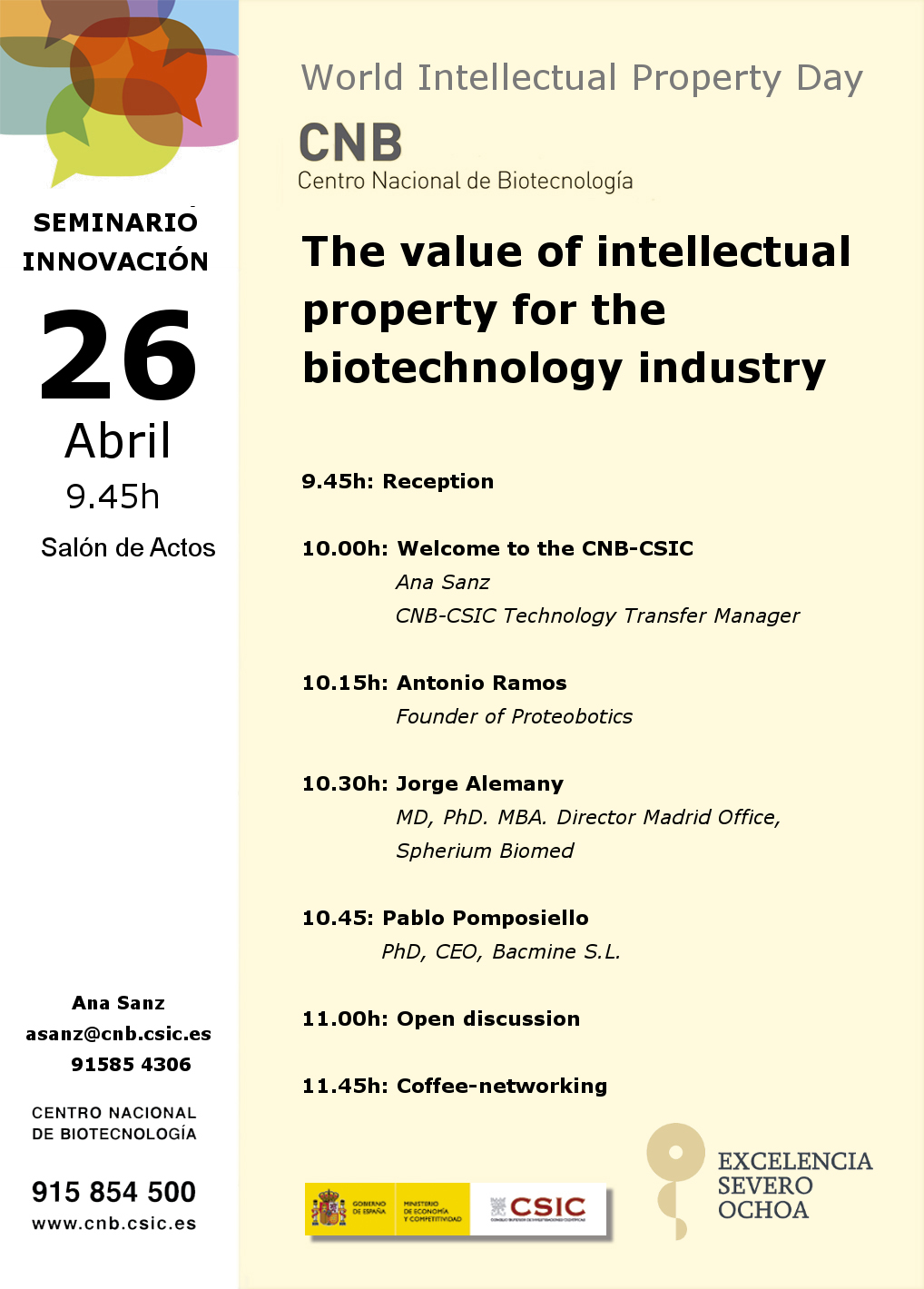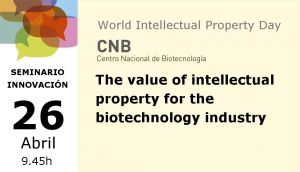 On the occasion of World Intellectual Property Day on 26 April, the Centro Nacional de Biotecnología of the CSIC CNB-CSIC) will celebrate a day of debate entitled "The value of intellectual property for the biotechnology industry”.
On the occasion of World Intellectual Property Day on 26 April, the Centro Nacional de Biotecnología of the CSIC CNB-CSIC) will celebrate a day of debate entitled "The value of intellectual property for the biotechnology industry”.
Hand-in-hand with several companies in the sector, the need will de analyzed to protect research results with patents or other forms of intellectual property, depending on the business model.
Antonio Ramos, founder of Proteobotics, Jorge Alemany, director of the Madrid office of Spherium Biomed and Paul Pomposiello, founder of Bacmine S.L. will speak at a conference organized by Ana Sanz, responsible for the innovation office at the CNB-CSIC. Their presentations seek to raise awareness in the biotechnology world of the importance of safeguarding the knowledge generated in research centres. In addition,they hope to lead a debate that invites the audience to reflect on the best protection strategy for each case, depending on the business model to be developed and the type of knowledge generated.
This event joins many others promoted by the World Intellectual Property Organization (WIPO) that will take place worldwide to mark this day. Activities are planned in hundreds of places around the planet to highlight the importance of ownership in all areas of intellectual creation.
To patent or not to patent: that is the question
Biotechnology is a field in which technology advances very quickly, but the economic return can be quite slow. In many cases, intellectual property (patents or know-how) is important to ensure a return on investment in publicly funded research and development centres.
According to Sanz, "In biotechnology, the patent is the most common form of intellectual property protection. It is important that the results generated in public research centres such as the CNB-CSIC reach society by licensing to companies."
"Nonetheless,” Sanz notes, “it is not always desirable to protect inventions with a patent.
While in biomedicine it is often most appropriate because the investment in a drug is very high, in other areas such as industrial biotechnology, a patent might not be necessary.”
According to Sanz, products can often be transferred to companies without patent protection. "The strategy will depend much the business model of the company. I hope we will have the opportunity to discuss this matter in the conference on the 26th," she concludes.
The commitment to intellectual property at the CNB-CSIC
Research carried out at the CNB-CSIC is applied to various fields such as medicine, agriculture and the environment. According to Sanz, the CNB's mission is to "develop solutions to some of the problems our society faces, such as health or environmental pollution. In the CNB-CSIC, we do research to improve our lives."
The results generated by the centre’s lines of research are protected primarily through patents. But, Sanz suggests, a patent is not always the best option. "Patents are a method of protection that apply to certain commercially viable results. It is thus important to keep in touch with companies and investors to determine market needs, and that scientists offer solutions for those needs," says Sanz.
In addition to technology transfer to established companies, another way the CNB-CSIC shows its commitment to innovation is by promoting the creation of new companies or spin-offs by its researchers. Sanz says "We help scientists with an entrepreneurial spirit to create new spin-offs. This is the ideal choice, because patents that arise from research centres like ours are almost always embryonic, and proof of concept is needed before they can be brought to the market. For this reason, licensing these patents to companies is very difficult. Once this testing has been done, risk is minimized and it is easier to interest a large company. A spin-off company might be the right environment for these early tests."
The CNB-CSIC is a research center that has sought from the outset to support translation of research and generation of knowledge that affects people’s lives, and to promote progress in society through science.






